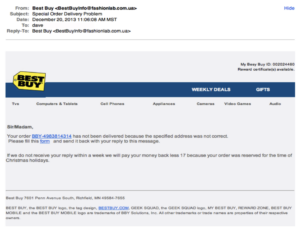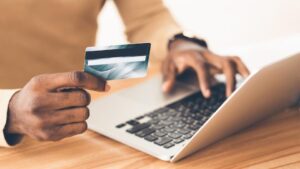Below, you will find some of the ways we suggest you approach your new found shopping experience and what to watch out for when shopping online.
1. Question Everything!
If the deal seems too good, normally it is. I know it is tempting to see an awesome deal and say, “Wow, I am so lucky!!!”, but you aren’t. As a matter of fact, these scammers have offered this deal to millions of other SO LUCKY people. My rule of thumb is 20%. If it is greater than 20% off of the normal price, start becoming skeptical of the person offering this AWESOME DEAL!
For most of your awesome deals, stick to the credible stores and brands. Best Buy, Amazon, etc…. I do not want to discredit the small entrepreneur who may be an affiliate marketer (someone who is selling the product for another and gets a percentage of the sale by using their own marketing dollars) or is a new brand and wants to build their name, but at least look at the reviews and credibility of the person or brand.
2. Email Scams.
Unfortunately, the cyber scrooges have found ways to exploit the goodness in people’s hearts during the holiday season.
Email phishing scams are rampant during the holidays.
Cyber security is necessary when opening any and all emails this holiday season for this reasons please think twice before CLICKING ON LINKS OR ATTACHMENTS WITHIN THESE EMAILS
Cyber criminals send fake holiday e-cards with links that are malicious and steal personal information.
McAfee also reports, “Since many people do a lot of their holiday shopping online, users should also beware of shipping notification scams, as respondents […] have fallen victim to these scams throughout this year.” In this picture, the email looks super legit. The logo looks real and the colors are pretty perfect. So how would I know that this email is fraudulent? Of course look at the logos and email addresses, but in this email, read the content. Most companies do not misspell. They have proper grammatical content. Read this content and you will see. 
This particular seasonal scam is a threat this year due to the high number of shipping delays.
If you receive a suspicious email about a delivery, do not open the links or respond with any personal information.
Sadly, charity donation scams are also an issue during the holiday season.
According to UCLA IT Security, “Cyber criminals try to take advantage of generosity given during the holiday season and may use fake charity requests to gain access to your information or computer/device. Don’t click on links in emails requesting donations. Contribute by navigating to the trusted address of the charity.”⁵
Cyber security tip – If the email has typos, grammar errors, or the company logo looks different, assume it is a phishing email.
3. Check the URL
One way to practice cyber security online during the 2020 holiday season is to pay attention to the URL.
The URL is the website address, such as https://watchdogsecuritygroup.com.
A website’s URL can tell you if it is a secure site.
Secure websites should use https. The “s” means secure.
Additionally, the padlock icon appears to the left of the website address on secure online retailers.
Cyber security tip – If you receive an email with links, hover over the link to see the URL where you would be taken if you clicked it.
4. Use a Credit Card
When shopping online, always use a credit card instead of a debit card.
It is better to have your credit card compromised than for a cyber criminal to drain your checking account.
Plus, credit cards offer fraud protection.
If you use a credit card and are a victim of fraud, the credit card company will fight for you because it’s their money. If you use a debit card and are a victim of fraud, you have to fight for your money.
U.S. News explains, “Fortunately, if you become the victim of card-not-present fraud, your liability is minimal. Under the federal Fair Credit Billing Act, you’re not liable for unauthorized transactions when your credit card number (not the card itself) has been stolen.”
If you do not have a credit card, think of using services like PayPal. You can attach your debit card or checking account to your secure PayPal account. This way PayPal secures your information. If you have a dispute, PayPal will hold the funds until the dispute is resolved.




